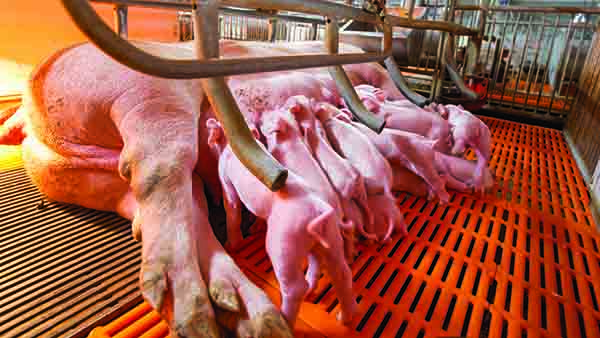A decision by the German Government to phase out farrowing crates is likely to intensify the UK Government’s desire to do something similar in the UK, according to the NPA.
Last week, Germany adopted new rules giving producers eight years to remove insemination stalls and 15 years to replace farrowing crates. There will be Government support for the transition, but German farmers fear the move will force producers out of business.
The UK Government has repeatedly made clear it intends to phase out farrowing crates on UK farms.
There was a commitment in the new Pig Welfare code for to ‘move towards a future where farrowing crates are no longer needed’, while Prime Minister Boris Johnson recently indicated his desire to ban the system in the House of Commons.
Government Ministers have shown a good understanding of the issues when calls to ban farrowing crates have been discussed in the House of Commons. Speaking during the recent End the Cage Age debate, Farming Minister Victoria Prentis said the Government does not want to risk ‘outsourcing’ animal welfare issues to other countries by banning farrowing crates.
She also acknowledged key points raised by the NPA, including the need to make progress towards a system ‘that both works commercially and safeguards the welfare of the sow and her piglets’ before farrowing crates are banned.
Defra Minister Zac Goldsmith, now in the House of Lords but still a driving force in the debate over farrowing crates in the UK, is keen to discuss welfare reform in the UK with the NPA.
NPA chief executive Zoe Davies stressed that the momentum is growing. She said: “There is no doubt that the Government is focused on phasing out farrowing crates at some point and it will use this news from Germany as leverage to make that happen sooner. The tide is shifting, but we are in regular dialogue with the Government on the issue.
“We will continue to argue very much against a ban as it goes entirely against the new collaborative approach Defra has been taking of late. Regardless of the outcome, , we will push for as long a transition as possible.”
“Defra needs to understand that not only are there initial costs of converting the system and issues with securing planning, there will also be an on-going cost for the reduction in productivity which the consumer will need to pay for. Producers will also need support in terms of training to help them adapt to the new system and keep piglets and staff safe.
“Particularly as we negotiate new trade deals, we must not end up in the situation we found ourselves after the UK banned sow stalls in 1999, losing our own producers only to import pork in large quantities produced from systems using sow stalls. A repeat would be a disaster for the UK pig sector and do nothing for the welfare of pigs.”
The German ban
The eight-year transition period for insemination stalls is intended to give producers time to come up with an alternative concept, submit a building application and construct the new building. For hardship cases, two more years can be added.
Much like we already have in the UK, sows will only allowed to be confined at the time of insemination, after which they will have to be transferred directly to the group housing in the waiting area
An unrestricted usable area of 5m² per sow will be required, divided into a lying area, activity area and retreat area.
For farrowing houses, producers must come up with a concept and submit an application for an adapted system within 12 years, with another three years to construct the new facilities. Again, the authorities can allow a further two years in the case of hardship.
The farrowing pen will have to be 6.5m² and sows will be able to be temporarily crated for the first 5 days after farrowing.
The Federal Government announced that the €300 million funding will be available under the COVID-19 economic stimulus program.
German producers organisation ISN welcomed the clarity the decision brought after many years of uncertainty and said that the transition period at least offered ‘a basis for operational development’.
But, in a useful summary of the changes, it said the move would be a ‘huge’ change for producers and questioned some of the details, including the 5m² space requirement in the service areas.
The DBV farming union also expressed concern. It welcomed the fact that producers finally had planning and legal certainty. But DBV President Joachim Rukwied said: “This decision is very painful for the sow owners and will force small and medium-sized businesses in particular to exit.”




